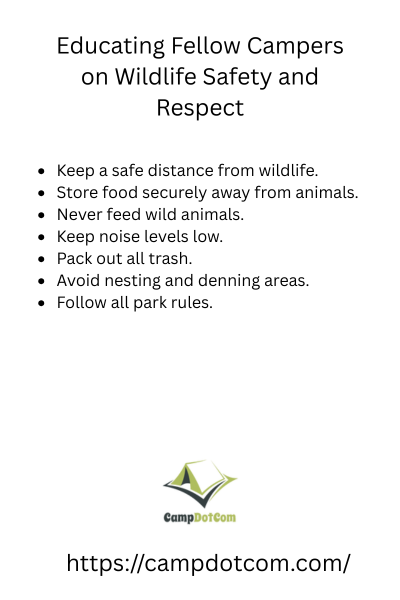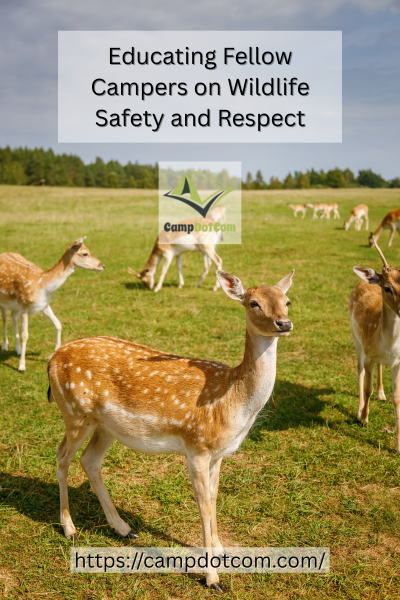When it comes to camping, educating fellow campers on wildlife safety and respect is something I have come to realize is just as important as packing the right gear or finding a good campsite. Honestly, you cannot just show up and hope everyone “gets it” on their own because some folks might not know the first thing about coexisting peacefully with nature’s wild residents.
Let me tell you about the time I first learned just how crucial this is. A few years ago, I was on a weekend trip with friends in a popular national park. One night, we heard rustling near our tents. Turns out, a raccoon was rummaging through some unattended food left out by another camper. The raccoon was clever, but it got more than just a snack, it got a little too comfortable around people. That moment really shocked me because it was a clear example of what happens when campers do not respect wildlife boundaries.
Read More About Educating Fellow Campers on Wildlife Safety and Respect

Why Does Educating Fellow Campers on Wildlife Safety and Respect Matter?
Think about it: when campers aren’t careful, they unintentionally create problems for animals and themselves. Feeding or attracting wildlife can lead to animals losing their natural fear of humans, which is bad news for everyone. Animals that get used to human food can become aggressive or dependent, and sometimes parks have to relocate or euthanize them to keep things safe. It’s heartbreaking and avoidable.
As an Amazon Associate, I earn from qualifying purchases. Some of the links in this article are affiliate links. This means that, at zero cost to you, I will earn an affiliate commission if you click through the link and finalize a purchase.
Educating fellow campers on wildlife safety and respect helps keep these beautiful creatures wild and the camping experience safe and enjoyable for all. It’s like a ripple effect — you share a tip with someone, and they pass it on. Suddenly, fewer tents have snack leftovers lying around, and the critters stick to their own turf.
More Things to Know About Educating Fellow Campers on Wildlife Safety and Respect

What Does Respecting Wildlife Actually Look Like?
Respecting wildlife means more than just not feeding the animals. It’s about understanding their habits and giving them space. For example, if you spot a deer grazing nearby, don’t try to get closer for that perfect photo. Let it be. The same goes for bears, foxes, and even the tiny chipmunks scurrying around.
Also, wildlife respect means managing your campsite to reduce encounters that might stress animals out or put you at risk. That means storing food properly in bear-proof containers or hanging it high in a tree if containers aren’t available. Trust me, nothing ruins a good night’s sleep like a raccoon raid or worse, a curious bear visit.
Sharing Tips Without Sounding Like a Know-It-All
I get it sometimes it feels awkward to chime in when you see someone leaving food out or trying to pet a squirrel. You don’t want to come off as a camping buzzkill. But here’s a little trick I learned: approach it with kindness and a little humor.
One time I told a fellow camper, “Hey, if that raccoon learns you’re sharing snacks, it might RSVP to your next campfire!” That got a laugh and opened the door to chatting about keeping food safe. You don’t have to be preachy just friendly and helpful.
Easy Ways You Can Help Educate Others
You don’t have to be a park ranger to make a difference. Just start with the basics:
Lead by example: Keep your own campsite tidy, store food correctly, and don’t feed animals.
Share stories: Like that raccoon incident — stories stick better than rules.
Ask questions: “Have you heard about why we store food in bear containers?” It invites conversation instead of lecture.
Pass along resources: Maybe keep a printed guide or download a quick checklist on your phone that you can casually share.
When you take these small steps, you become part of a positive camping culture that values wildlife safety and respect.
What Happens When We Don’t Educate Fellow Campers on Wildlife Safety and Respect?
I’ve seen campsites where garbage is scattered, food is left out, and animals have no choice but to rummage through human leftovers. Not only does this harm the animals, but it attracts predators and increases conflicts. It can even lead to park closures or stricter rules, which none of us want.
Plus, it’s downright sad to see wildlife losing their natural behaviors because of careless camping. They belong in the wild, not depending on humans for meals.
Educating Campers on Wildlife Safety Starts with You
If you’ve stuck with me this far, you’re probably excited to take some action next time you hit the trails. And good news, educating fellow campers on wildlife safety and respect isn’t complicated. It’s about caring enough to share what you know and leading by example.
Next time you’re around the campfire, maybe drop a friendly reminder about food storage or share a funny wildlife story. You’d be surprised how much difference it makes. After all, camping is about enjoying nature, and that includes letting the wild side stay wild.
So, are you ready to be the camper who helps keep the peace between people and wildlife? I bet you are.
Happy camping and keep those snacks safe!
